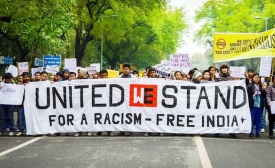
Sudarshan Ramabadran of the India Foundation's Center for Soft Power suggests Indian culture could serve as a lens in the growing need for "cultural competence."

Either Facebook starts sharing more information about how its algorithms work, or social media platforms will be reduced to battlefields for 21st century warfare.
The companies say they are acting on this problem. Facebook says it has begun to use artificial intelligence to spot images, videos and text related to terrorism as well as clusters of fake accounts. Meanwhile, Twitter says it suspended 299,649 accounts in the first six months of this year - 75% of these before their first tweet. The companies are now sharing databases of suspicious material, and they have set up the Global Internet Forum to bring together the major players on the issue.
In partnership with ProPublica, Google News Lab is launching a new tool to track hate crimes across America. Powered by machine learning, the Documenting Hate News Index will track reported hate crimes across all 50 states, collecting data from February 2017 onward.
SOS Alerts have been developed with the aim of delivering important updates to users during major disasters. [...] The company says “major natural, manmade, or humanitarian disasters” will activate the alerts, but it “can’t guarantee that you’ll see an SOS Alert for every major crisis”.
Google has unveiled four measures it will use to tackle the spread of terror-related material online. Among the measures it is deploying will be smarter software that can spot extremist material and greater use of human experts to vet content. [...] In addition, it said, it would work with Facebook, Microsoft and Twitter to establish an industry body that would produce technology other smaller companies could use to police problematic content.







